Discover why building a strong brand is essential for every startup. It helps establish credibility, attract customers, and drive growth. A cohesive brand strategy is vital to ensuring that all branding efforts work together to build credibility and drive growth. Learn key reasons to invest in brand development early.
Take Nectar, for example — a startup that didn't just launch, it landed. Even in the competitive, high-stakes world of Silicon Valley, Nectar knew from the outset that a bold brand identity would be its key to success.
While many tech startups get lost in a sea of sameness, Nectar leaned into consistent, global-ready branding that made them instantly recognizable and trustworthy. Their story is proof: investing in brand development early isn't just smart — it's essential for long-term success.
Identity, as it is called, helps to position the company and build trust and loyal customers. A strong brand fosters trust, loyalty, and lays a solid foundation for business growth and scaling. Therefore, to be successful, any startup must create a strong brand identity, with a particular emphasis on brand personality. Partnering with a startup branding agency can accelerate this process, making it faster, more strategic, and more impactful.
Mission Control empowers startups to transform their vision into compelling brand experiences, combining creative strategy, design, and venture support for lasting impact.
When Should Startups Begin Focusing on Branding
Branding is important for all businesses, especially for startups, and it should be started early. An early start on branding helps with public perception and growth before a business even launches. Founders should start with branding even when they are focusing on product and early funding.
What should a startup do?
When starting a business, a startup needs a clear vision and consistent messaging. Make branding a key vision in proving the concept stage. Keep everything aligned.
Source: Getty Images on Unsplash+

The Long-Term Benefits of Branding
What do you think of when you hear about business promotion? It becomes easier to identify where the product will be positioned in the market and what messaging will be most effective for communicating with customers. Branding helps streamline marketing and identify business advocates.
Investors will build trust in a business when a brand is reliable and professional. This is how branding will start to pay off. Trust, professionalism, and order will all increase when branding is effective.
Early brand building makes defining a niche and building a unique identity possible, which is even more important in overly crowded markets.
Starting your brand from day one builds your company's longevity and strengthens relations with customers and other stakeholders. Continuous branding keeps that unique identity as the company grows.
Understanding Startup Brand Psychology
Strong startup branding is based on the most basic forms of psychology and on how people connect emotionally to a new company.
A strong brand narrative will bridge the gap and grab the attention of customers, investors, and potential employees by describing the company's mission and values in a humanized way. This creates a sense of brand connection.
Psychology Behind Brand Transparency
Being authentic is more than just "keeping it real." Building trust through consistent behavior, open honesty and communication, and values alignment is especially crucial for startups with rapid growth and change.
Bringing authentic brands into balance between vulnerability and capability. They have a vision, but also must be able to demonstrate it. This balance is really a start to reducing the fear of being a first follower.
A few really simple trust-maintaining structures, such as a values-based decision-making framework and a systematic approach to transparency, will guide you to trust as you scale.
Source: freepik.es

Empathetic Branding
The emotion-fueled intelligence behind a brand involves understanding the emotional needs of customers, investors, and the team in a startup environment, as each group has distinct drivers and expected outcomes.
Emotional intelligence in customers focuses on the reasoning behind the buying decision. As a business evolves and expands, its positioning is likely to shift as early adopters and later mainstream users each seek different emotional benefits.
Understanding emotional intelligence in investors involves recognizing that funding decisions, unlike business decisions, are also made on emotional grounds. Backing a changing vision of the world is emotionally driven, as is being part of the transformation and supporting meaningful change.
Emotional intelligence among employees helps strengthen a culture and reduce employee turnover. Effective culture branding channels heated, innovative energy alongside the emotionally stabilising structures the team requires to perform at their best.
Color Psychology and Visual Brand Psychology
Color psychology in branding goes beyond choosing appealing colors. It involves understanding how different colors trigger specific emotional and behavioral responses. For startups, strategic color choices can convey competence, innovation, trust, or energy, depending on the business objectives.
A strong visual identity, built from carefully chosen brand elements such as logo, colors, and graphics, helps create a memorable brand image that stands out in the market.
Startup color strategies should consider both immediate emotional impact and long-term brand evolution. Colors that work well for early-stage consumer engagement may not be suitable for B2B sales or international expansion. This requires systematic color planning from the beginning.
Visual brand psychology includes typography, imagery, layout, and design patterns that influence subconscious perceptions. Understanding these psychological principles enables startups to make informed design decisions that support business goals, rather than merely catering to aesthetic preferences.
Color Wheel Illustration by Clay
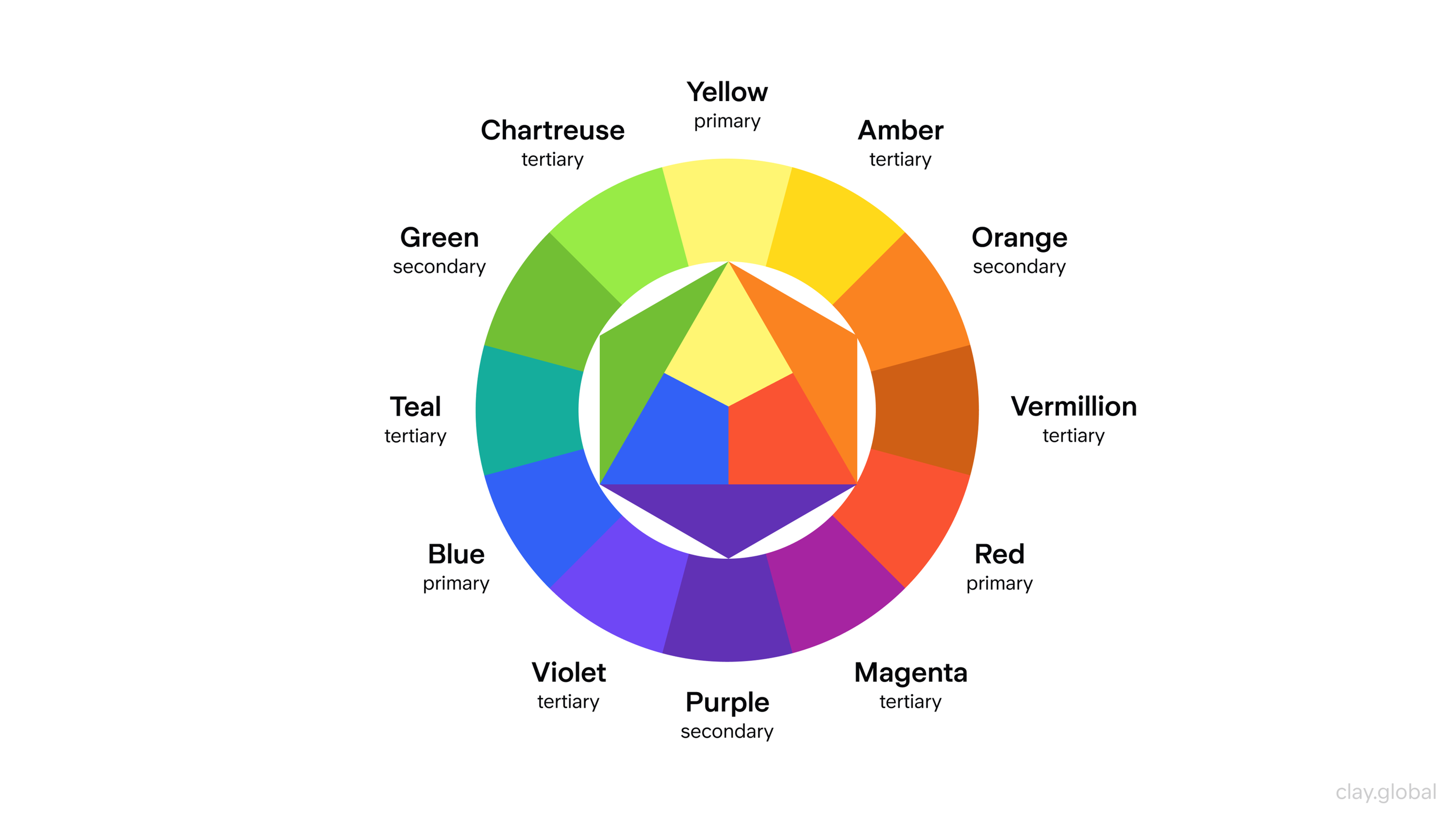
Building Startup Brand Architecture
Systematic brand architecture provides the structural foundation that supports consistent brand experiences across all touchpoints while enabling rapid scaling and evolution.
A solid brand is built on clear brand guidelines and a comprehensive style guide, which ensures consistency in visual identity and messaging throughout every interaction.
Startup Brand Architecture Framework
Brand architecture for startups must strike a balance between clarity and flexibility. It provides clear direction while allowing for rapid iteration and growth. This framework encompasses brand hierarchy, relationship mapping, and scalability planning that anticipates future business growth and evolution.
Master brand strategy defines how your startup's core brand relates to potential product lines, services, or business units. Even single-product startups benefit from architectural thinking that prepares for eventual diversification or acquisition scenarios.
Sub-brand development guidelines help startups maintain brand coherence as they launch new products or enter new markets. Clear architectural principles prevent brand confusion while supporting business growth and market expansion.
Brand positioning matrices provide systematic approaches to competitive positioning that go beyond simple differentiation. These matrices map emotional benefits, functional benefits, and brand personality across competitive landscapes to identify unique positioning opportunities.
Brand Architecture Examples
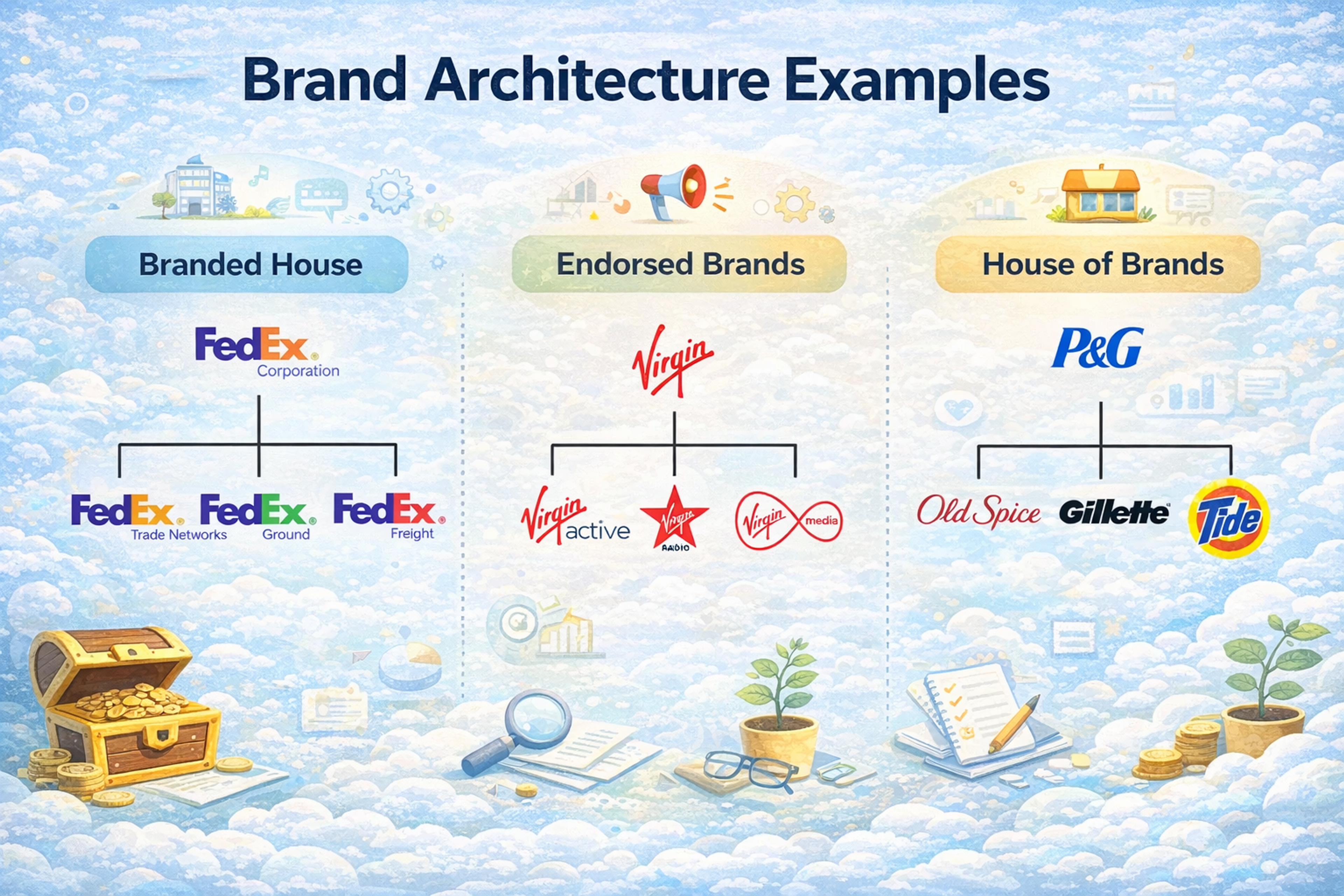
Startup Brand Maturity Planning
As early-stage startups, startup brands must first recognize that they develop in stages, and that each stage requires varying strategies and resources. Investing in branding requires understanding your stage.
In the early stages, brands must focus on authenticity, the founder's story, and clear, concise communication of product-market fit. Then, in the mid-stages, firms must add repeatable branding processes, support team alignment, and develop scalable brand systems.
In the final stage, firms must focus on stronger brand measurement systems and management, as well as prepare to enter and compete in international markets.
Third-party frameworks for brand evolution are invaluable for preserving brand equity and customer confidence during transitions that involve pivots, new funding rounds, or new market expansions.
Advanced Brand Strategy and Positioning
In early-stage startups, venture capitalists are trying to evaluate the potential risks of brand fidelity.
However, in fast-moving markets, there are three frameworks that, if used correctly, should give strong startup positioning: market movement, competitive pressure, and resource scarcity.
Strategic Brand Positioning Matrix
Positioning matrices compare your startup with competitors regarding functional and emotional benefits, brand personality, and overall market position.
Compared with simple differentiation, positioning matrices add greater value, especially in more saturated markets. When doing competitive analysis, consider both direct competitors and indirect alternatives that address the same problem through different means.
On top of that, they help you think about how positioning may need to change as markets mature, new entrants emerge, and customer expectations evolve.
Your point of differentiation should be defensible and difficult to imitate. The strongest positions tend to be multilateral, rather than those that depend on singular reinforcing features or claims.
Brand Alignment Strategy Development
Brand alignment strategies ensure that all business decisions support and strengthen brand positioning rather than undermining it. This alignment becomes increasingly crucial as startups grow and decision-making becomes more distributed.
Brand governance systems establish processes for maintaining brand consistency across different teams, products, and markets. These systems should be sophisticated enough to ensure quality while remaining flexible enough to support rapid growth and expansion.
Cross-functional brand integration ensures that brand strategy influences product development, customer service, sales processes, and operational decisions. Integrated brand thinking creates more substantial competitive advantages than purely marketing-focused branding.
Brand Alignment Strategy
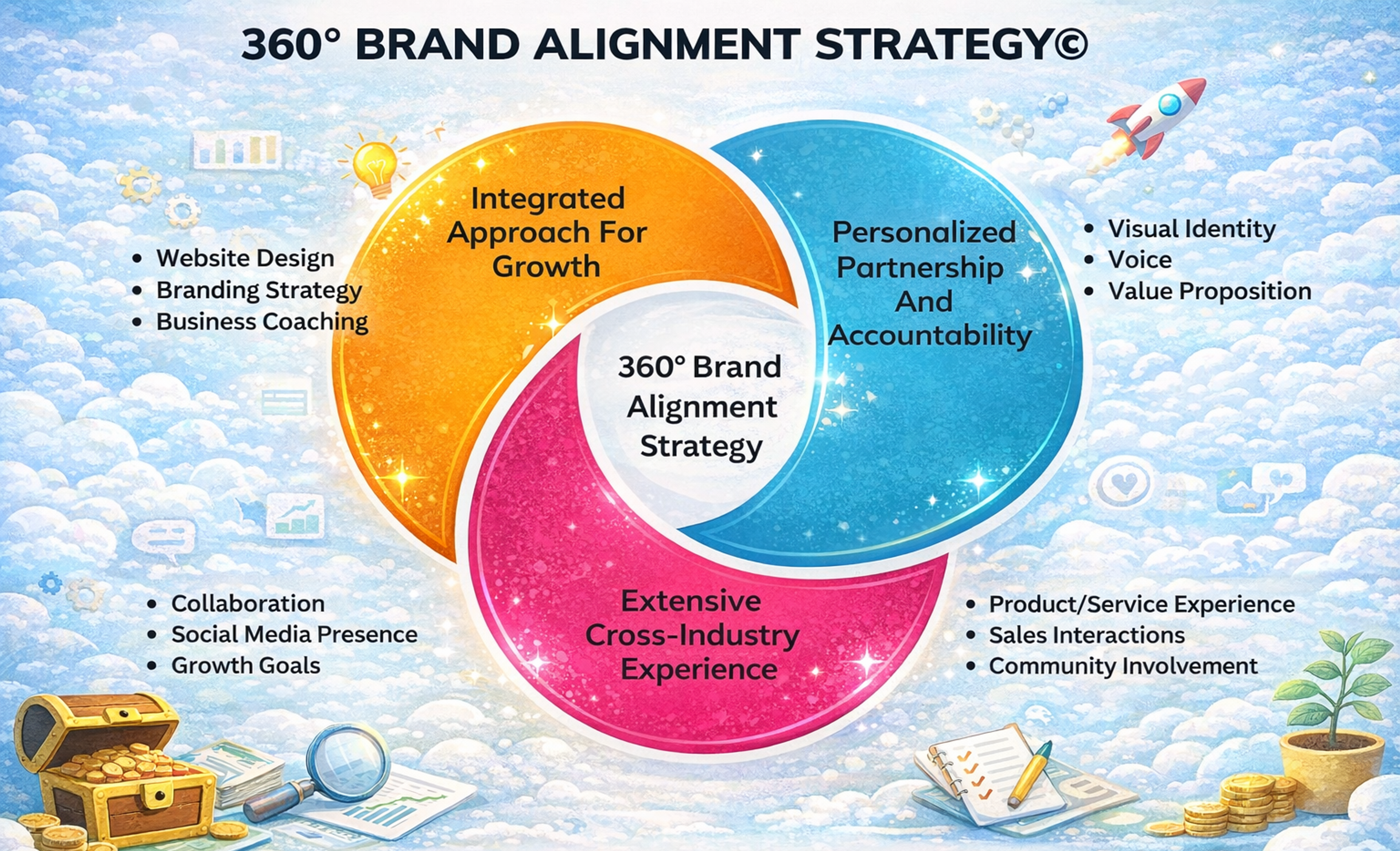
Brand Experience Mapping and Journey Design
Systematic experience design enables startups to create cohesive brand experiences that foster relationships and drive business results across complex customer journeys. By mapping the customer experience, startups can ensure that customers connect with the brand at every point of interaction.
Customer Journey Mapping for Startups
Compared to larger organizations, startup journey maps have longer decision cycles, involve more stakeholders, and require greater onboarding effort. Touchpoint optimization focuses on key interactions and addresses the most important ones to create a cycle of continuous improvement.
Emotional journey mapping. Journey maps can track customer experience in a structured way. This addition focuses on capturing customer satisfaction and performance at different phases to help the team make the right optimizations.
Customer Journey Mapping
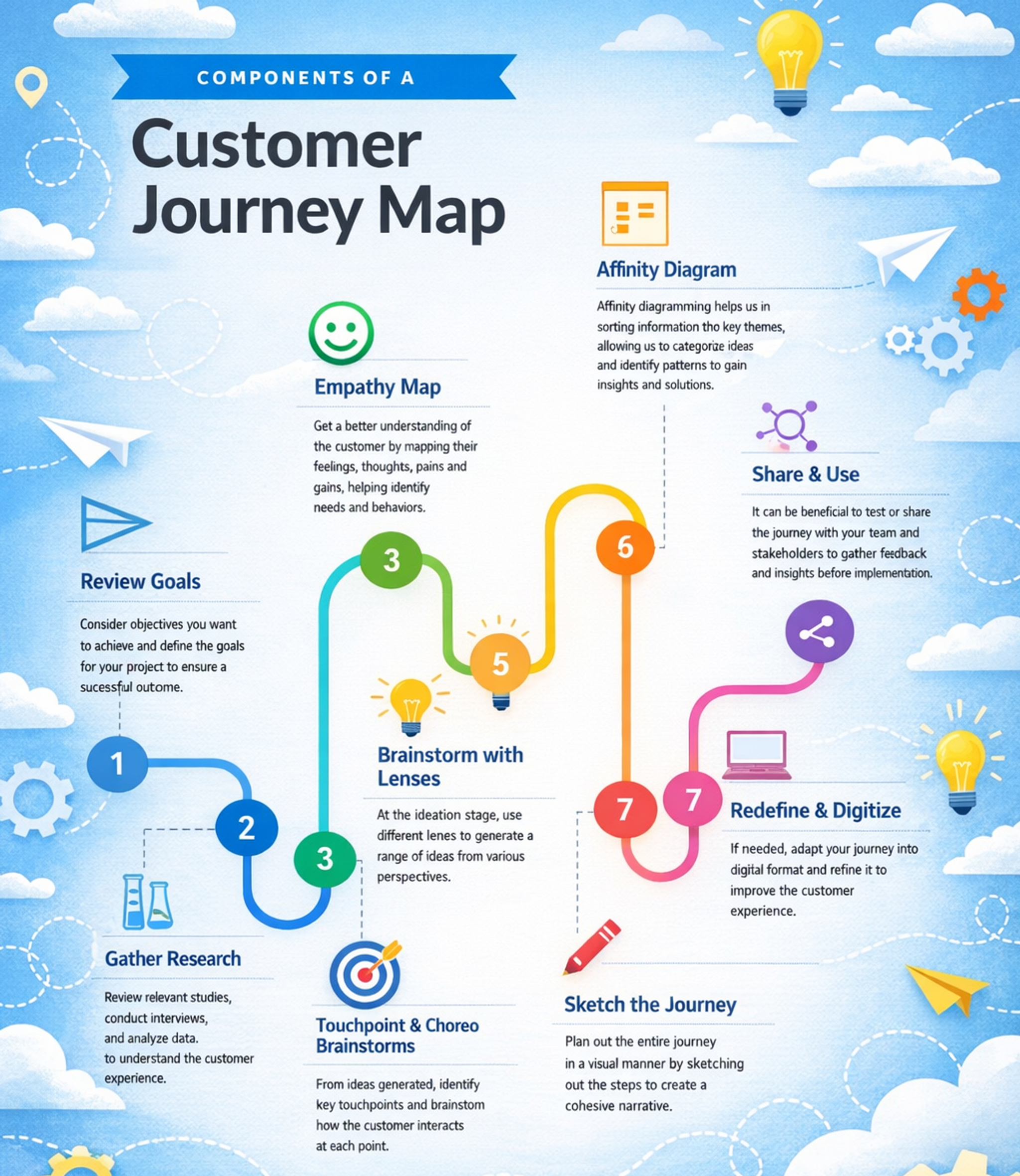
Brand Analytics and Intelligence Systems
Sophisticated measurement and analysis capabilities help startups make data-driven brand decisions while building competitive intelligence that informs strategic planning.
Branding is crucial for startups because it not only shapes customer perceptions but also helps position the company as an industry leader, enabling it to compete effectively and build lasting trust in its market.
Brand Sentiment Analysis and Monitoring
Brand sentiment analysis examines the perceptions and conversations of customers, the media, and stakeholders about the brand.
For startups, this can help identify early warning signs and growth opportunities. Social listening goes further by monitoring social media, reviews, forums, and online communities to understand competitors better.
Brand perception with awareness, consideration, preference, advocacy, and overall brand health provides teams with additional quantitative insights to prioritize brand spend and optimize strategies.
Brand perception, combined with sentiment and social listening metrics, and competitor perception metrics, allows for analysis of your brand’s performance against both direct competitors and indirect substitutes.
This provides insights to capture white space, optimize positioning, and improve agility to market changes.
Brand Sentiment
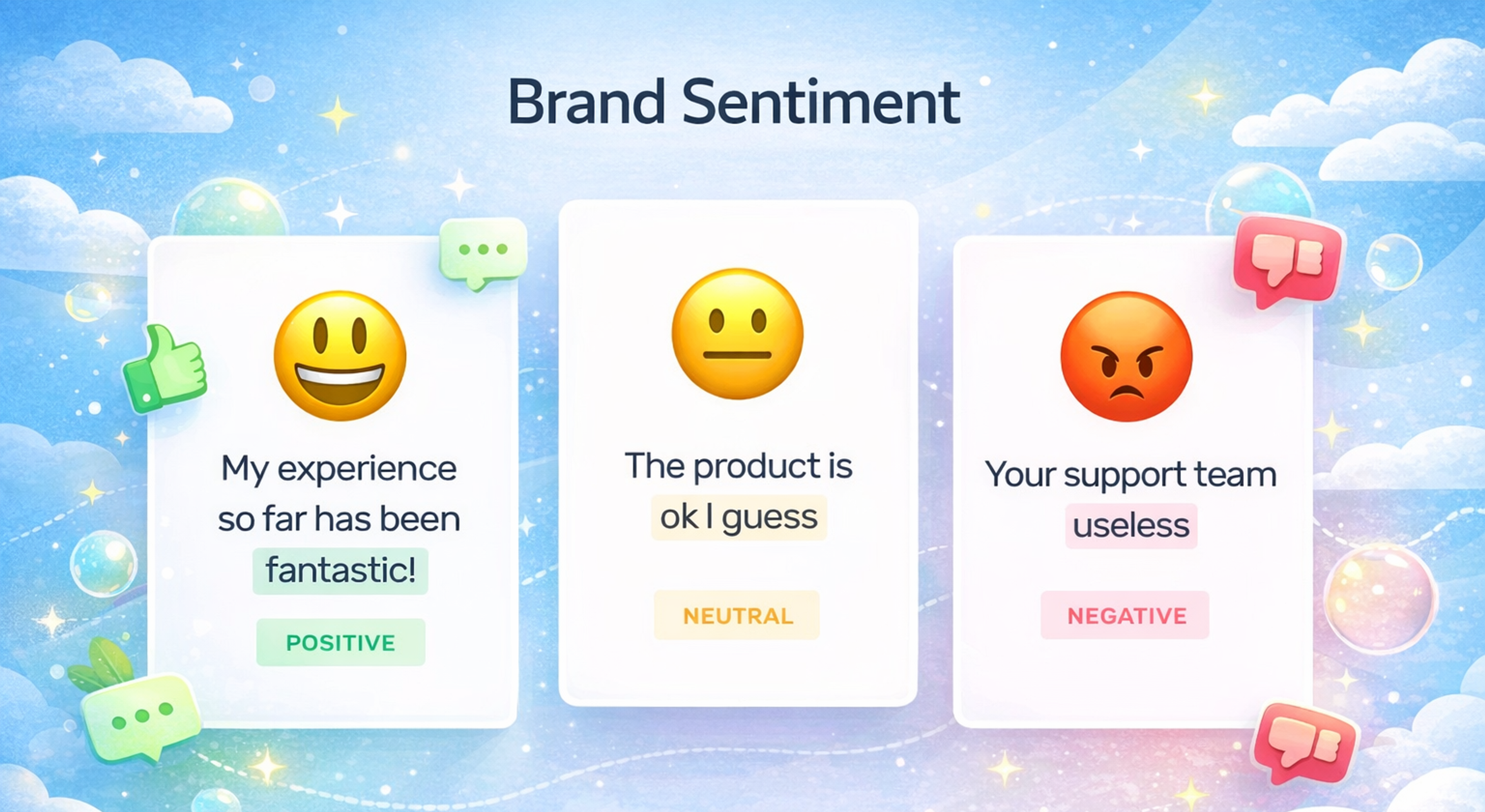
Competitive Brand Intelligence
Brand sentiment analysis provides systematic monitoring of how customers, media, and other stakeholders perceive and discuss your startup brand. For startups, sentiment tracking reveals early warning signs and growth opportunities.
Social listening strategies enable startups to understand their brand perception across various social media platforms, review sites, forums, and other online communities. Strategic social listening offers competitive intelligence in addition to brand monitoring.
Sentiment measurement frameworks establish consistent approaches to tracking brand perception over time. These frameworks help startups understand perception trends and the impact of brand-building investments.
Brand perception metrics provide quantitative measures of brand health, awareness, preference, and advocacy. Understanding these metrics helps startups track brand progress and optimize brand investments.
Case Studies: Using Branding to Drive Growth
Branding is key in business expansion, as evidenced in various sectors. Building brands through professional branding services can help startups achieve growth and market expansion by developing a strong brand identity and consistent messaging.
Companies can increase their market share and profits by constructing a comprehensive brand and fostering emotional attachments with customers. Let us now look at some unconventional ways effective branding strategies work.
Warby Parker
Warby Parker established a name for itself in the competitive eyewear market through its innovative and friendly branding and advertising. The company has captured the attention of many socially aware customers with its global campaign, which advertises the sale of eyeglasses under the slogan "Buy a Pair, Give a Pair."
Source: warbyparker

Allbirds
Allbirds positioned itself as the most comfortable shoe for eco-friendly consumers. Its ultra-minimalist design, coupled with natural materials and communicative branding, effectively enabled the company to occupy the niche for environmentally conscious consumers.
These cases demonstrate that with careful planning and execution, branding can enhance the credibility and marketability of smaller companies, underscoring the importance of investing in a brand identity.
Source: allbirds

Tools and Resources for Effective Startup Branding
Developing a strong and recognizable brand is critical for a startup's success. Well-designed marketing materials, which include visual elements and messaging, are essential components of a startup's branding strategy.
Startups can leverage printing services to produce branded marketing materials as part of a comprehensive marketing strategy, ensuring consistency and professionalism across all touchpoints.
They must be cohesive and reflect the brand's identity to effectively connect with the target audience and convey the company's values.
Below are some essential tools and resources that can help streamline the branding process:
Logo Design Tools
A professional logo is a fundamental element of any brand. Tools like Looka enable startups to create visually appealing logos that align with their brand identity.
Brand Strategy Resources
To define and refine your brand's mission, vision, and values, resources like HubSpot's Brand Development Guide provide frameworks and templates for building a cohesive strategy.
Consulting with a startup branding agency can provide valuable insights and expertise, helping startups navigate the complexities of branding and avoid common pitfalls.
While startup branding agencies offer branding services tailored specifically for startups, other branding agencies may focus on broader markets or established companies, making specialized agencies a better fit for the unique needs of startups.
Color and Font Pickers
Consistent use of colors and fonts sets the tone for your brand. Tools such as Coolors can help pinpoint palettes and typography that support your message.
Social Media Management Tools
An active social media presence is crucial for effective branding. Platforms like Hootsuite and Sprout Social help plan and schedule posts, ensuring a consistent voice across channels.
Digital Asset Management
Efficiently managing your branding assets ensures consistency in your outreach. Tools like Brandfolder and Bynder help centralize assets, such as logos, brochures, and templates, for easy access and management.
Source: brandfolder

Website Builders
A well-designed website is a digital storefront for any brand. Tool like Squarespace offer user-friendly options for startups to create their online presence.
Analytics and Feedback Tools
Understanding what resonates with your target audience is key to refining your brand. Tools like SurveyMonkey and Hotjar provide insights to measure branding effectiveness and gather feedback.
Feedback from early customers, combined with thorough market research, is crucial for refining branding and messaging to ensure they align with audience needs and expectations.
By leveraging these tools and resources, startups can establish a strong, memorable brand that resonates with their audience and supports long-term growth.
Read more:
FAQ
What Branding Does My Startup Need?
A startup needs a clear positioning statement, a memorable name, a simple visual identity, a consistent voice, and a website that effectively communicates its value. Early branding should focus on clarity and trust more than complex design systems.
How Much Should A Startup Spend On Branding?
Most early-stage startups allocate between 5% and 15% of their initial marketing budget to branding. A lean starter brand kit can cost a few thousand dollars, while complete strategy and identity work typically increases in cost with the depth of research and deliverables.
When Should A Startup Think About Branding?
Start thinking about branding as soon as you know who you serve and why your product matters. Branding becomes essential before building a website, pitching investors, launching campaigns, or entering competitive markets.
Which Company Offers The Best Startup Branding?
The best agency is the one that understands early-stage constraints, works efficiently, and can demonstrate both measurable outcomes and visuals. Look for teams with proven startup experience, strong strategy, and flexible, phased pricing.
How To Do Branding For A Startup?
Define your target audience, clarify your value proposition, choose a name and voice, create a simple visual identity, and build a website that clearly communicates your offer. Keep everything consistent across touchpoints and update the brand as you learn from real customers.
How To Choose A Branding Agency For A Startup?
Choose an agency with relevant case studies, a clear discovery process, transparent pricing, and experience working with early-stage teams. Ask how they research users, how they test concepts, and who actually does the work. The right partner should help you focus your message, not complicate it.
Conclusion
Strong brands aren’t built to look good. They’re built to last. Investing in your brand pays off in real ways: recognition, trust, loyalty, and long-term growth.
Even as a lean startup, you don’t need a huge budget to stand out. Clear values, consistent messaging, and a bit of creativity can help you claim a distinct place in the market.
Show up with purpose, speak your audience’s language, and deliver something that resonates. Do that consistently, and your brand becomes more than a name. It becomes something people want to join.


About Clay
Clay is a UI/UX design & branding agency in San Francisco. We team up with startups and leading brands to create transformative digital experience. Clients: Facebook, Slack, Google, Amazon, Credit Karma, Zenefits, etc.
Learn more

About Clay
Clay is a UI/UX design & branding agency in San Francisco. We team up with startups and leading brands to create transformative digital experience. Clients: Facebook, Slack, Google, Amazon, Credit Karma, Zenefits, etc.
Learn more


